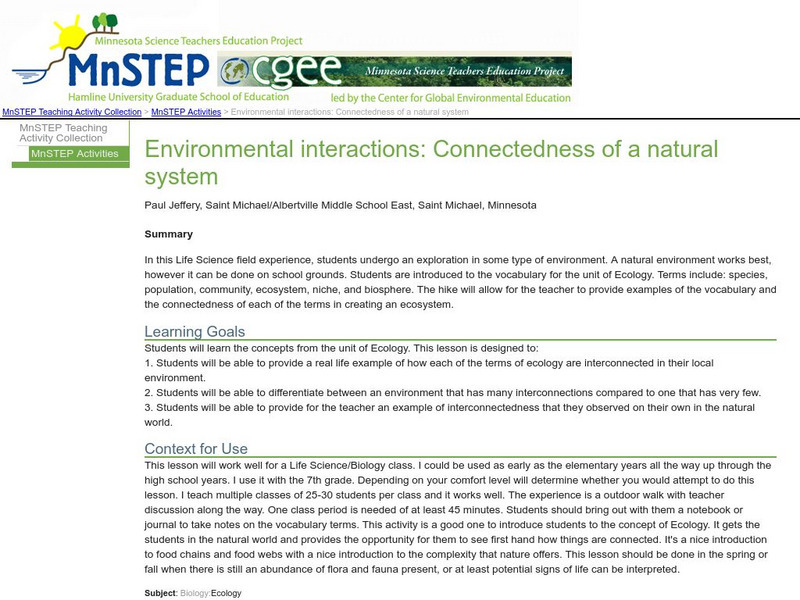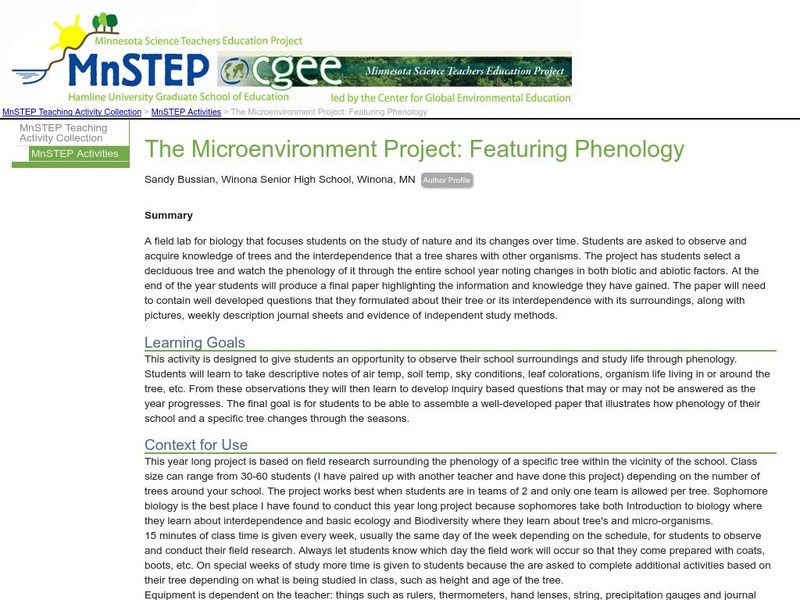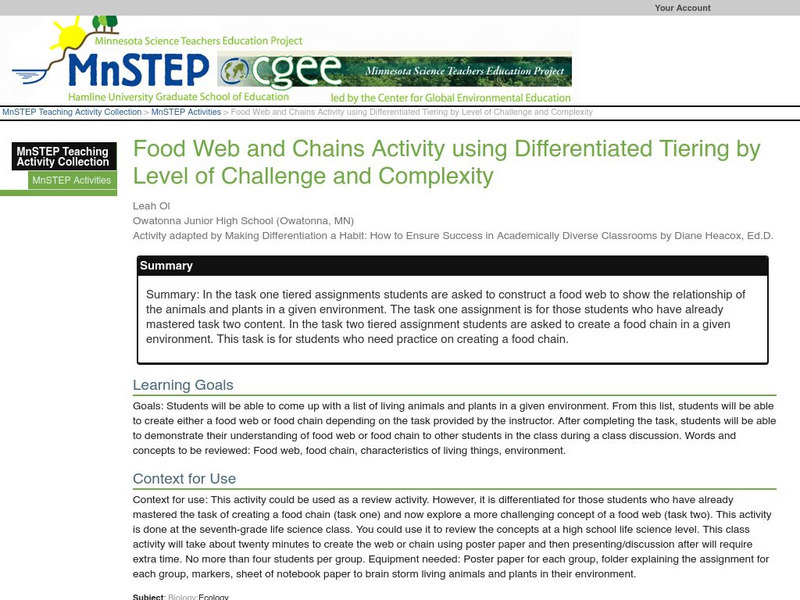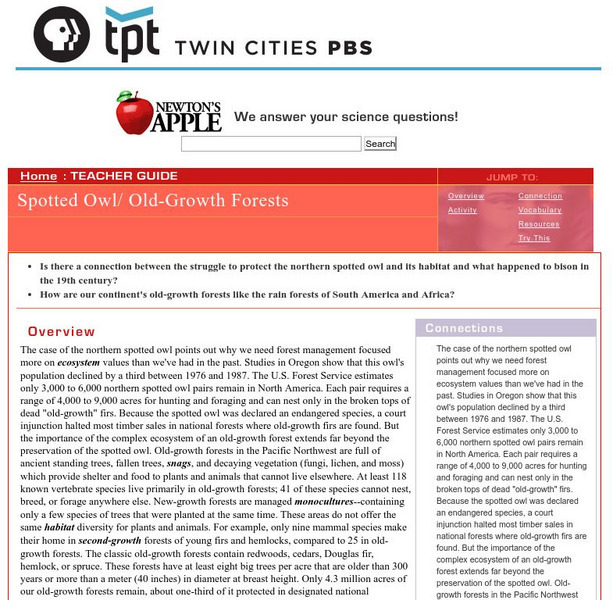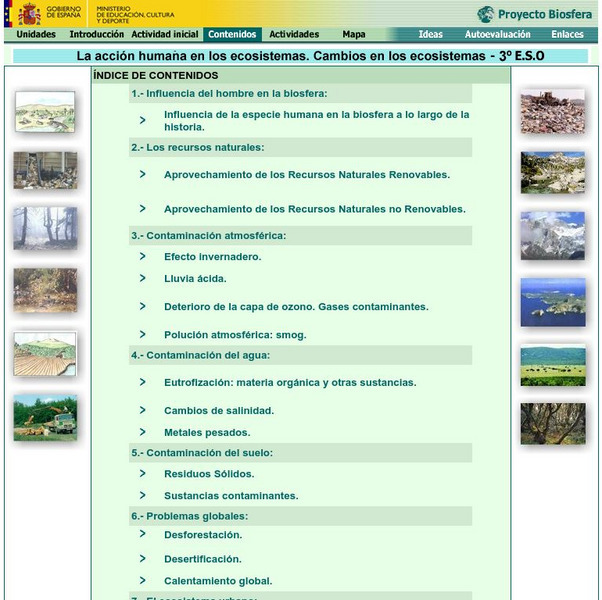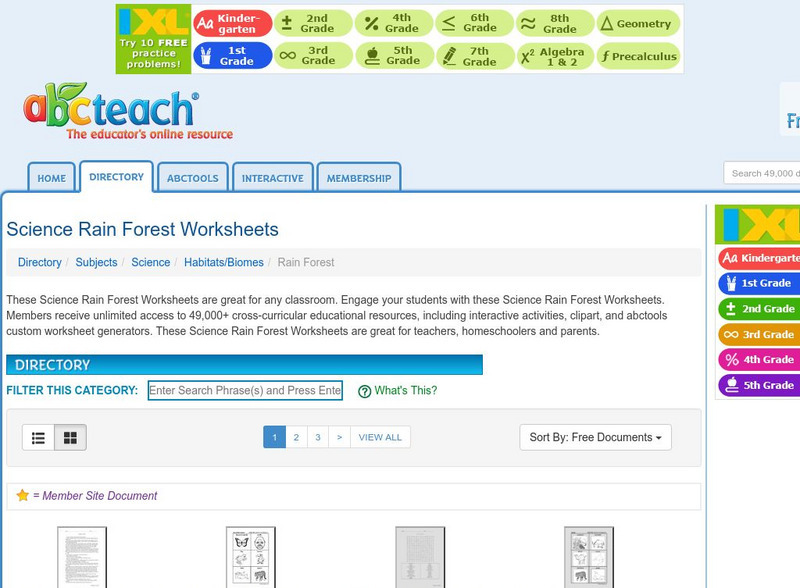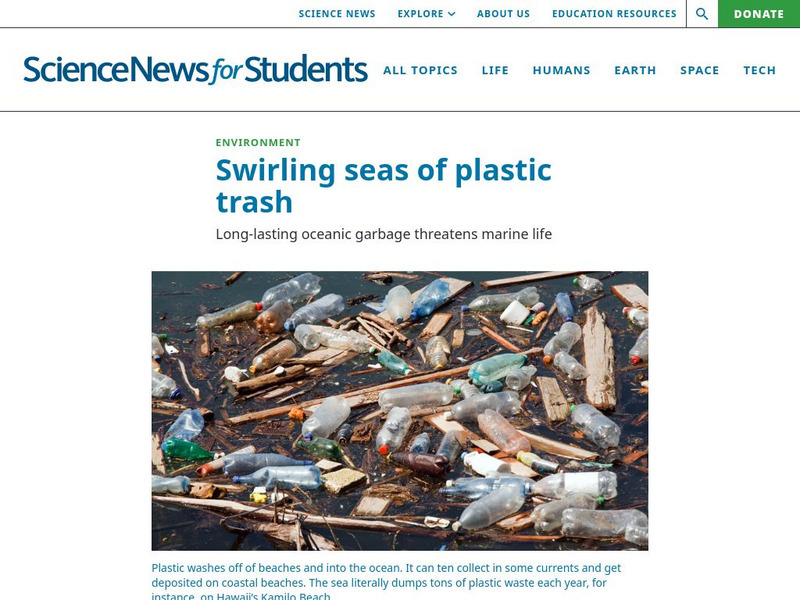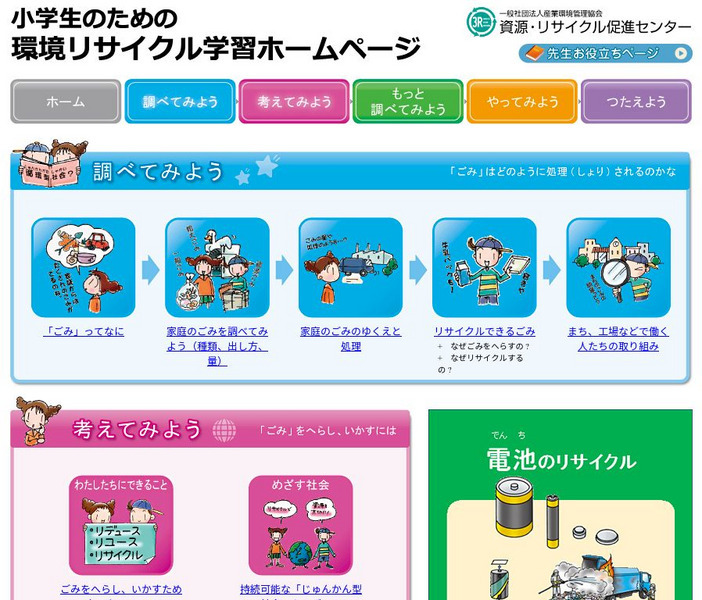Hi, what do you want to do?
Science Education Resource Center at Carleton College
Serc: Food Chains: Nature's Restaurant
Students begin this lesson by making observations and recording evidence of the variety of living things in local nature site. Students use reference materials to research predators and food of the animals they observed, then illustrate...
Science Education Resource Center at Carleton College
Serc: Environmental Interactions: Connectedness of a Natural System
A field experience where learners undergo an exploration in a natural environment. They are introduced to the concepts of species, population, community, ecosystem, niche, and biosphere.
Science Education Resource Center at Carleton College
Serc: The Microenvironment Project: Featuring Phenology
A field lab for biology that focuses students on the study of nature and its changes over time. Students are asked to observe and acquire knowledge of trees and the interdependence that a tree shares with other organisms.
Science Education Resource Center at Carleton College
Serc: Using Plant Surveys to Study Biodiversity
An extended field investigation intended as launch into several concepts in environmental science including biodiversity, human impacts on natural systems, and energy transfer in ecosystems.
Science Education Resource Center at Carleton College
Serc: Differentiated Tiering Food Web and Chains Activity
Two differentiated tasks about food chains and webs. In the more challenging task, students construct a food web to show the relationship of the animals and plants in a given environment. In the lower level task, students create a food...
Science Education Resource Center at Carleton College
Serc: Epa's Environmental Education Center
A collection of fact sheets, brochures, and web pages about environmental issues. Topics include acid rain and air pollution, ecosystems, human health, waste and recycling, conservation, and water-related concepts and issues.
PBS
Newton's Apple: Spotted Owls and Old Growth Forests
This site from Newton's Apple, which is a production of KTCA Twin Cities Public Television, provides insights, vocabulary, resources and a main activity on the subject of why owls are threatened.
National Institute of Educational Technologies and Teacher Training (Spain)
Ministerio De Educacion: La Accion Humana en Los Ecosistemas.
Throughout this unit, you will see how man change and affects the environment in which they live. You will have a better understanding of our need of matter and energy and the consequences of their use and abuse. It contains 19...
National Institute of Educational Technologies and Teacher Training (Spain)
Ministerio De Educacion: La Transferencia De Energia en Los Ecosistemas
Learn about the transfer of energy in the ecosystem.
National Institute of Educational Technologies and Teacher Training (Spain)
Ministerio De Educacion: La Dinamica De Los Ecosistemas
This unit shows how ecosystems change over time and how matter and energy, which are essential to its operation, are transformed and passed from one living thing to another forming, in some cases, authentic cycles. It contains 19...
American Institute of Biological Sciences
Action Bioscience: Speciation and Biodiversity
As many species are going extinct due to healthy habitats being destroyed humans are depleting the world of its natural resources. Understand the repercussions of environmental destruction on species and biodiversity through this interview.
American Institute of Biological Sciences
Action Bioscience: Environmental Impacts of Marine Exotics
Invasive species are disrupting many bodies of water in North America. Scientists share their reasons for concern in this brief article. Supporting and educator resources are provided.
abcteach
Abcteach: Rain Forest
[Free Registration/Login Required] This site provides numerous links to facts, photos, information and activities all dealing with the rain forest. Teachers will find these links helpful in planning activities and lesson plans on the...
FT Exploring
Ft Exploring: Energy Pyramid and Food Chains
This illustrated guide to food chains and ecological pyramids will help clarify how energy flows through an ecosystem.
Society for Science and the Public
Science News for Students: Swirling Seas of Plastic Trash
Describes the multitude of plastic trash scientists have found on a beach in Hawaii and in the oceans. Explains what a gyre is, and how plastic trash gets trapped in the eye of a gyre. Looks at the serious impact plastic materials have...
PBS
Pbs Kids: Martha Speaks: Can You Dig It?
Practice reading with Martha with this illustrated, read-along story about the environment, habitats, and ecosystems.
PBS
Pbs Kids: Cyberchase, Rescue Ecotopia
A game for kids to understand the basics of an ecosystem and keeping it balanced. A brief description of the animals and how they fit within the system is provided before the game begins.
Oswego City School District
Regents Prep: Ecosystems/communities
Abiotic factors vary in the environment and determining the types and numbers of organisms that exist in that environment. Factors which determine the types and numbers of organisms of a species in an ecosystem are called limiting...
TED Talks
Ted: Ted Ed: Feedback Loops: How Nature Gets Its Rhythms
Anje-Margriet Neutel describes some common positive and negative feedback loops, examining how an ecosystem's many loops come together to make its 'trademark sound.' [5:11]
TED Talks
Ted: Ted Ed: What's Hidden Among the Tallest Trees on Earth?
Wendell Oshiro tells the story of Stephen Sillett's bold exploration of the canopy of an ancient redwood and details some of the fascinating discoveries he made. [4:47]
Open Curriculum
Open Curriculum: Science of Ecology
This illustrated article helps students identify levels of organization in ecology.
University of Michigan
University of Michigan: The Concept of the Ecosystem
Lesson looks at the definition of an ecosystem, biogeochemical cycles, and factors responsible for the differences between ecosystems.
Other
Reef Base
This is a database on coral reefs where you can access coral reef data, take quizzes on corals, view images, get maps of reefs and more.
Other
Clean Japan Center: Recycling
Japanese content for elementary students. Helps younger children explore environmental issues. Topics include recyling, ozone destruction, global warming, and stewardship of natural resources. Good illustrations. Also includes reading...






